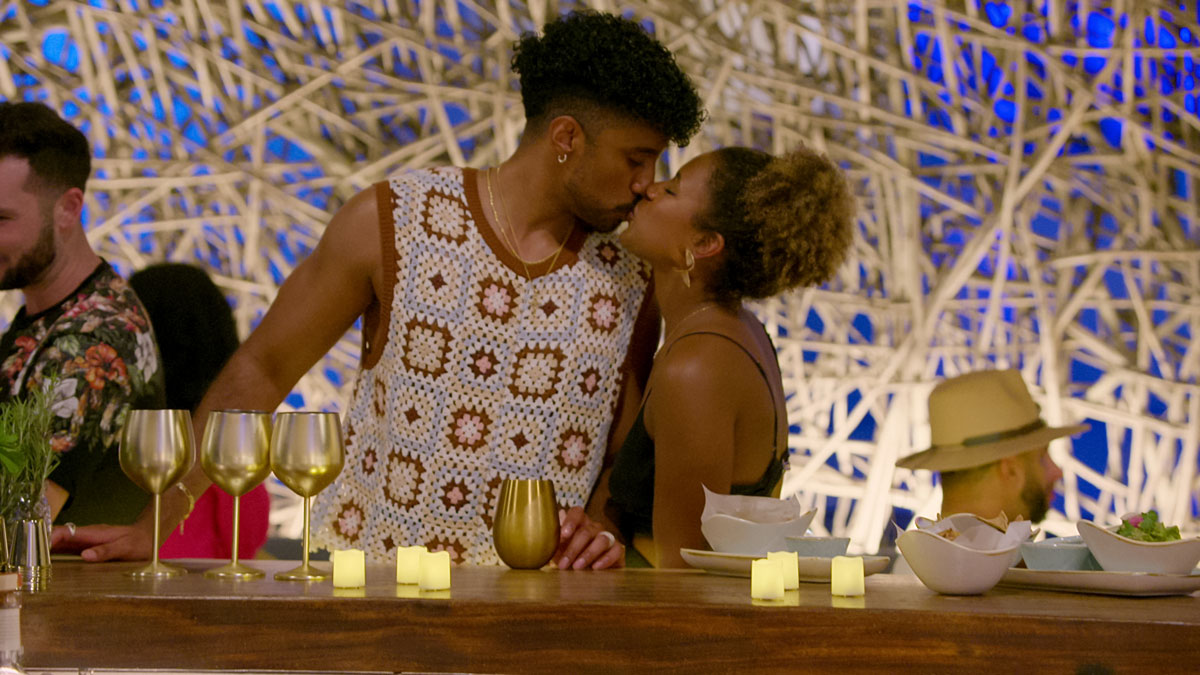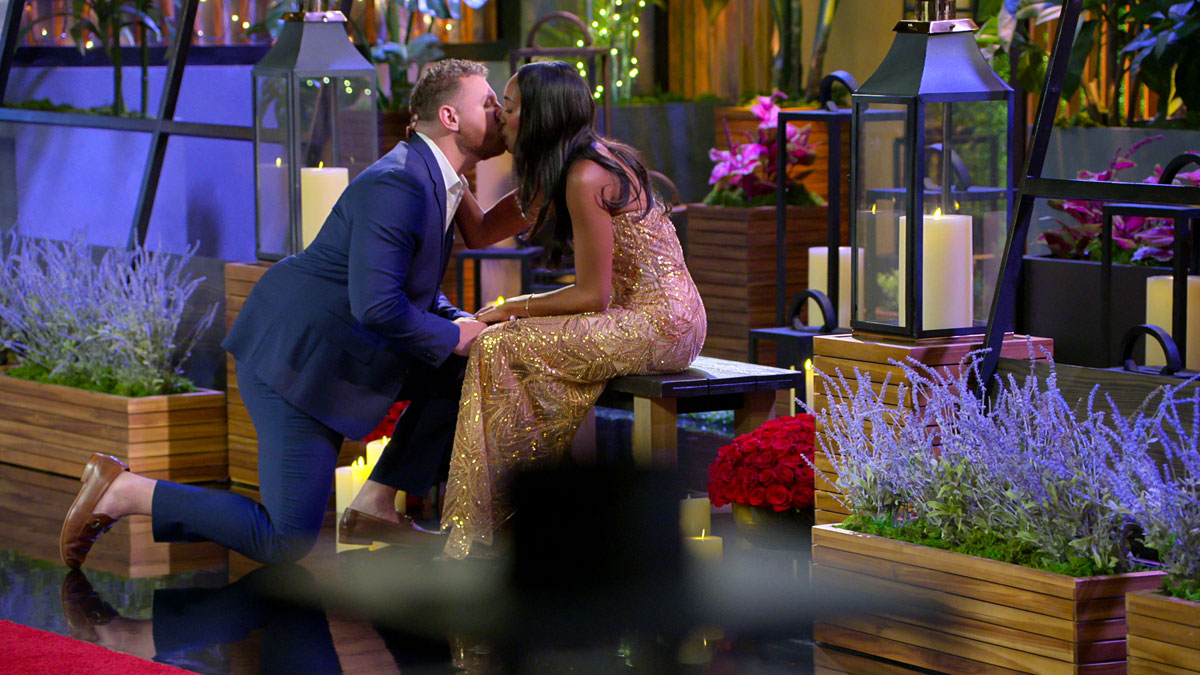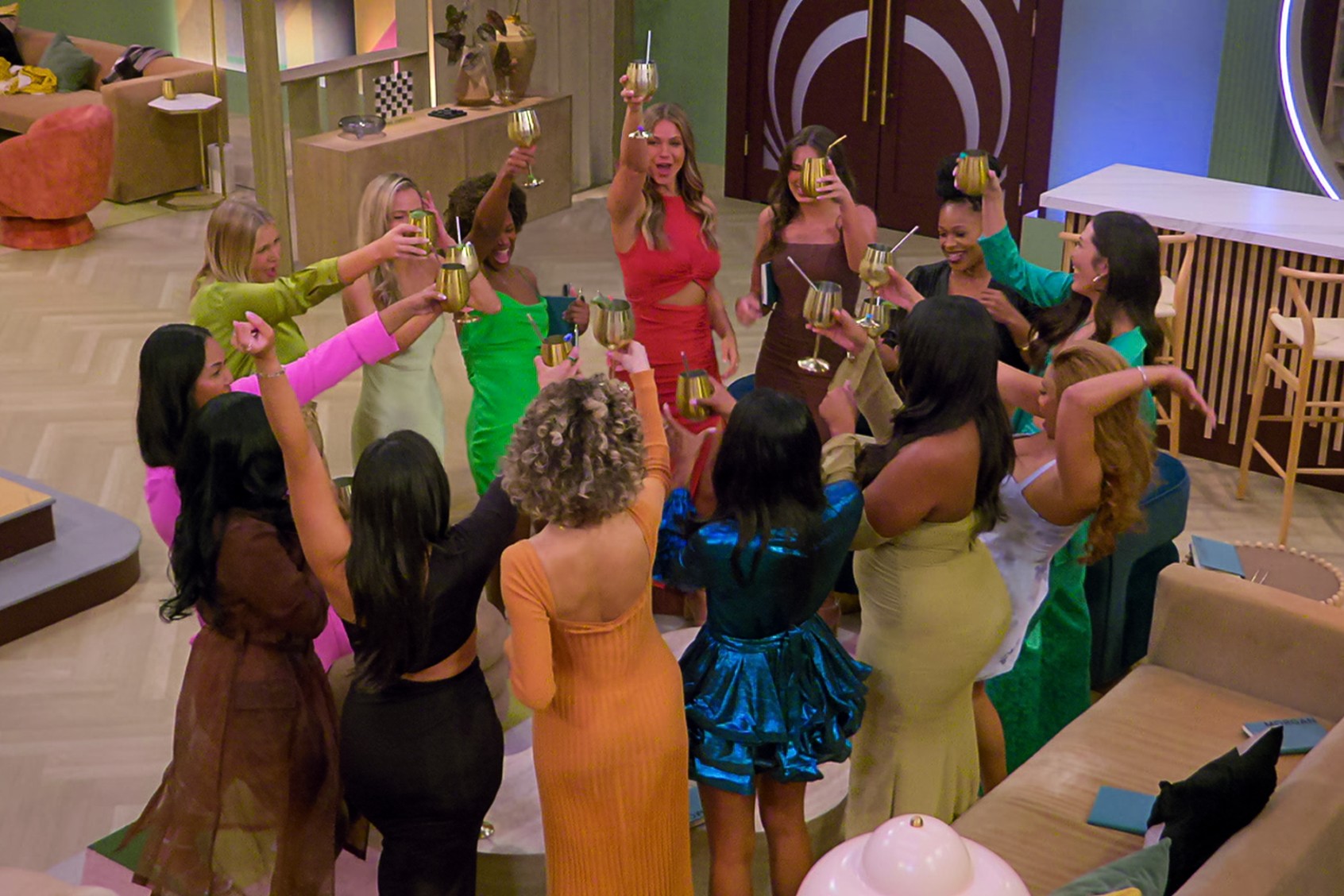The second episode of the Washington D.C. “Love Is Blind” season is named for a game a few women play to pass the time: “Perfect Husband, but…” It’s about as serious as a slumber party as they offer a series of theoretical dealbreakers: “Perfect husband, but he doesn’t wear shoes anywhere.” “Perfect husband but, like, he can’t read.”
One of them, Taylor, delivers a recurring version of “I can work with that” in response, offering to peruse the menus for both of them. Compromise, we’ve heard, is the backbone of any lasting relationship.
Reality series incorporate these little detours to keep the energy light and lively. Now that the show’s wedding episodes have aired, one can’t help wondering if the show’s producers were spooning out a bit of foreshadowing.
In this same episode, Ramses Prashad holds forth about his rejection of toxic masculinity, which warmed the heart of Marissa George, the woman on the other side of the famed blue wall dividing their dating pod.
 Ramses Prashad and Marrisa George in “Love Is Blind” (Netflix)“I absolutely love that more than you might realize, because I’m used to military masculine men,” George says, adding, “I usually date guys who are like, pretty smart. I dated a conservative Trump supporter for, like three years . . . But then I dated, like, a progressive liberal guy. Like, I date people for who they are.”
Ramses Prashad and Marrisa George in “Love Is Blind” (Netflix)“I absolutely love that more than you might realize, because I’m used to military masculine men,” George says, adding, “I usually date guys who are like, pretty smart. I dated a conservative Trump supporter for, like three years . . . But then I dated, like, a progressive liberal guy. Like, I date people for who they are.”
Later, Monica Davis asks Stephen Richardson whether he voted in the 2016 and 2020 elections. Richardson affirms he did, then reveals who he voted for.
“I’ll be completely honest: I voted for President Trump because I didn’t like Hillary in the first election,” Richardson tells Davis. “But I despise the way that he handled his time in office. And I voted for Biden, and I can honestly say I definitely put a lot more thought and passion into that second vote than I did the first. And I will happily admit that my first vote wasn’t the most educated.”
Perfect husband or wife, but . . .?
Since its 2020 debut, “Love Is Blind” has invited us to tag along as people who might not have given each other a glance in the real world fall in love in its pods based solely on the emotional connections forged by their conversation.
Hosts Nick and Vanessa Lachey frequently ask whether race, age, family, faith or financial considerations will get in the way of each couple making it to the altar.
But this may be the first season in which politics joins that list of possible stumbling blocks, even if they don’t say so. Actions are louder: Prashad’s reflexive response to George disclosing she dated a MAGA man is to blurt out an expletive.
No reality TV series is 100% honest in the way it presents its narratives. This one has several lawsuits and published allegations from past contestants of abusive workplace conditions attached to it to remind us of this.
Still, the fact that it took seven seasons for “Love Is Blind” to show participants’ conversations about their politics and voting choices shouldn’t go unnoticed.
Surely participants in prior seasons had these conversations, too. We just haven’t seen them.
The seventh’s D.C. setting probably made it necessary. The dating pool in our nation’s capital is stacked with singles who either work in government or politics, and it does not favor Republicans.
“When it comes to disclosing their affiliation with Trump, no ground is more fraught than courtship,” Politico observed back in 2018. “’Trump supporters swipe left’ —meaning ‘don’t even bother trying’—might be the single most common disclaimer on dating app profiles in Washington.”
Surely participants in prior seasons had these conversations, too. We just haven’t seen them.
That sentiment holds six years later and far beyond the district’s limits. Some “Love Is Blind” suitors didn’t even have to announce their affiliation to draw partisan-flavored scorn to their onscreen missteps.
Season 5’s Jared “JP” Pierce didn’t make it past the engagement vacation with his pod match, Taylor Rue, after he voiced that her makeup turned him off: “It felt like you were fake.” That’s enough of a red flag by itself, but JP’s 24/7 style commitment to stars, stripes and ye olde red, white and blue had viewers scouring footage for signs of a telltale scarlet cap.
Some might read clues about a person’s politics during the obligatory family visits. In Season 2, Kyle Abrams meets Shaina Hurley’s extremely religious brood where one of her brothers lists his hobbies as being outdoors, riding dirt bikes and “being an American” before he asks Kyle, an atheist, “Are you a Godly man?”
Assumptions viewers might have made about Shaina’s family in those moments say more about who they are than her. Reality TV is a safe space to be judgmental, and “Love Is Blind” offers us an expansive, cushioned one.
Unlike “The Bachelor” its suitors come by their matches honestly, in that the audience can see whether they’re advertising themselves truthfully before the person who can’t see them before they say yes finds out for themselves. In this sense, it confirms many of the horror stories and pitfalls of the modern era while frequently (albeit less in later seasons) reminding us that romance isn’t entirely six feet under and can overcome daunting obstacles.
Whether a couple makes it to “I do” at all depends on what brings each man and woman in this heteronormative marriage market together in the first place, which is truthful communication. Both couples moved beyond the Trump needle skips quickly, although George and Prashad struggled past another obstacle during the show’s seventh episode when they discussed her past Naval service. George grew up in a military family. Since leaving the Navy, she has come to oppose America’s interventionist policies while supporting the people who, like her, enlist at an age where they don’t entirely understand what they’re signing up for.
Prashad, being from Venezuela, says he takes “the perspective of people from the outside looking in . . . I understand that I’m privileged to live in this country. But, at the same time, I will always heavily critique how the U.S. has sort of just destabilized entire countries.”
Later he’ll mention Palestine, mostly in passing. This is still a show where whatever swishing inside those omnipresent golden goblets takes the edge of most tensions. But not all.
Want a daily wrap-up of all the news and commentary Salon has to offer? Subscribe to our morning newsletter, Crash Course.
In the end, the votes of Richardson and George’s past lovers had little bearing on why and how their relationships with Davis and Prashad imploded. Davis stumbled on a text chain on Richardson’s phone showing him exchanging lurid texts with another woman, putting his by-the-by remarks about his uncontrollable tumescence into eye-opening context.
Prashad’s willingness to marry George slowly chilled after he broached concerns about contraception (he didn’t want to use condoms, but he didn’t want children right away, placing the burden on George to figure things out) but eventually came down to a nebulous excuse about mismatched energies.
 Stephen Richardson and Monica Davis in “Love Is Blind” (Netflix)Kink-shaming Robertson or dragging Prashad for leading George right up to her bachelorette celebration before pulling the plug is easy. Social media users are making it this week’s new hobby. (Davis is making a multi-course Instagram meal of her heroic, in-the-moment insistence that Robertson Venmo her the money she lent him before he exited her life completely.)
Stephen Richardson and Monica Davis in “Love Is Blind” (Netflix)Kink-shaming Robertson or dragging Prashad for leading George right up to her bachelorette celebration before pulling the plug is easy. Social media users are making it this week’s new hobby. (Davis is making a multi-course Instagram meal of her heroic, in-the-moment insistence that Robertson Venmo her the money she lent him before he exited her life completely.)
But the deeper lesson in both their stories, one that recurs time and again, is the essentiality of being forthright with the other person about one’s history and identity, personal and political. That, and recognizing the obvious mismatches everyone at home can see.
Before they broke up Prashad and George wondered aloud if love was enough, while showing it might have been if he’d told her what she needed to know instead of what he wanted her to hear. Sight is only one sense and doesn’t tell even half the story.
All episodes of “Love Is Blind” are streaming on Netflix.
Read more
about this topic


